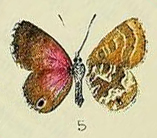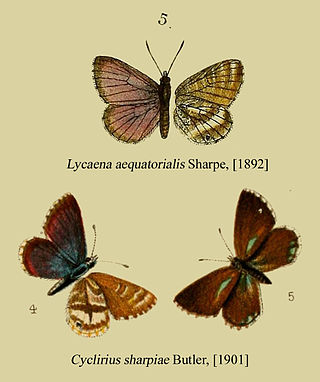
Lycaenidae is the second-largest family of butterflies, with over 6,000 species worldwide, whose members are also called gossamer-winged butterflies. They constitute about 30% of the known butterfly species.

Riodinidae is the family of metalmark butterflies. The common name "metalmarks" refers to the small, metallic-looking spots commonly found on their wings. The 1,532 species are placed in 146 genera. Although mostly Neotropical in distribution, the family is also represented both in the Nearctic, Palearctic, Australasian (Dicallaneura), Afrotropic, and Indomalayan realms.

Miletinae is a subfamily of the family Lycaenidae of butterflies, commonly called harvesters and woolly legs, and virtually unique among butterflies in having predatory larvae. Miletinae are entirely aphytophagous. The ecology of the Miletinae is little understood, but adults and larvae live in association with ants, and most known species feed on Hemiptera, though some, like Liphyra, feed on the ants themselves. The butterflies, ants, and hemipterans, in some cases, seem to have complex symbiotic relationships benefiting all.

Polyommatinae, the blues, are a diverse subfamily of gossamer-winged butterflies. This subfamily of butterfly was discovered in 1775. These butterflies have been considered one of the poorest studied groups within the family Lycaenidae.

Polyommatini is a tribe of lycaenid butterflies in the subfamily of Polyommatinae. These were extensively studied by Russian novelist and lepidopterist Vladimir Nabokov.

Harpendyreus is a genus of butterflies in the family Lycaenidae.
Harpendyreus notoba, the salvia blue, is a butterfly of the family Lycaenidae. It is found in South Africa, from the northern East Cape, through the southern part of the Orange Free State to southern Gauteng the southern North West Province. It is also present in the North Cape.

Harpendyreus noquasa, the marsh blue, is a butterfly of the family Lycaenidae. It is found in South Africa, from the KwaZulu-Natal Drakensberg, north along the escarpment to Mpumalanga.

Harpendyreus aequatorialis, the equatorial mountain blue, is a butterfly in the family Lycaenidae. It is found in Kenya, Tanzania and the Democratic Republic of the Congo. The habitat consists of montane grassland and moorland.
Harpendyreus argenteostriata is a butterfly in the family Lycaenidae. It is found in Kivu in the Democratic Republic of the Congo and in Rwanda.
Harpendyreus berger is a butterfly in the family Lycaenidae. It is found in north-central Tanzania.
Harpendyreus boma is a butterfly in the family Lycaenidae. It is found in Tanzania.
Harpendyreus hazelae is a butterfly in the family Lycaenidae. It is found in Malawi and Zambia.

Harpendyreus juno is a butterfly in the family Lycaenidae. It is found in southern Tanzania, northern Malawi and Zambia.
Harpendyreus major is a butterfly in the family Lycaenidae. It is found in the Democratic Republic of the Congo, Rwanda, Burundi, southern Tanzania and northern Zambia.
Harpendyreus marlieri is a butterfly in the family Lycaenidae. It is found in the Democratic Republic of the Congo.
Harpendyreus marungensis, the central mountain blue, is a butterfly in the family Lycaenidae. It is found in Uganda, the Democratic Republic of the Congo, Rwanda, Kenya and Tanzania. The habitat consists of montane grassland, moist savanna and the edges of roads in forests.
Harpendyreus meruana is a butterfly in the family Lycaenidae. It is found in Tanzania.

Harpendyreus reginaldi is a butterfly in the family Lycaenidae. It is found in Uganda, Rwanda and the Democratic Republic of the Congo.







